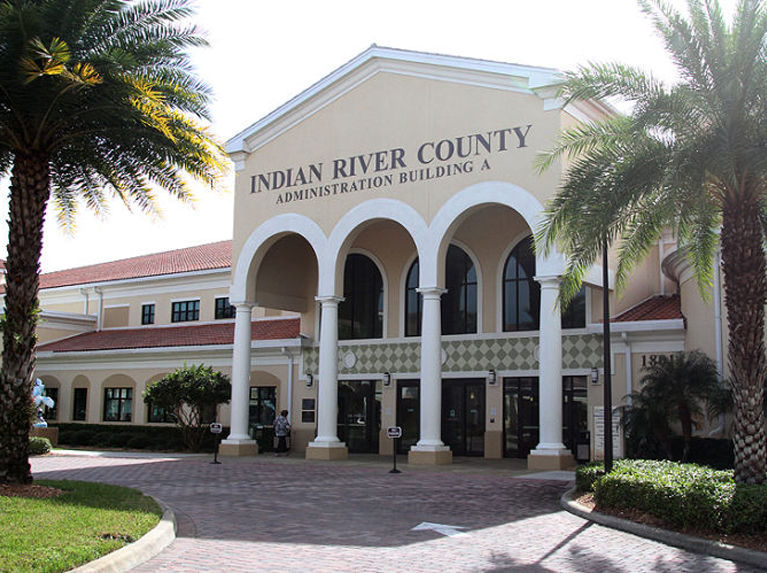
INDIAN RIVER COUNTY — After nixing a proposed fracking ban last year on a 3-2 vote, the Indian River County Commission changed its mind and, at a recent meeting, accepted Commissioner Peter O’Bryan’s proposal of an ordinance which would ban the process of hydraulic fracturing or “fracking” — injecting liquid at high pressure into subterranean rocks, forcing open existing fissures to extract oil or gas.
The highly controversial issue has generated a good bit of Tallahassee tap-dancing, pitting local governments against state agencies and the Legislature, which has thus far done nothing to regulate the industry, and has even loosened restrictions on toxic chemical discharges, including chemicals used in fracking.
After the 2015 vote, commissioners, feeling they needed more information before taking action, sent a letter to the Florida Department of Environmental Protection requesting that “the Legislature direct the appropriate agency to develop a clear and meaningful set of best management practices for fracking in Florida.” Legislation that would preempt local government control over fracking was proposed in the 2016 Legislative session, but the Legislature failed to pass any bills dealing with fracking, leaving the industry basically unregulated and the Commission without a response to its request.
O’Bryan explained that, this past May, the Department of Environmental Protection, as required by the Clean Water Act back in the 1990s, began revising its limits on toxic chemicals that are allowed to be released into Florida’s surface waters. In addition to adopting standards for 39 unregulated chemicals, the DEP proposed to increase thresholds for some of the 43 chemicals it currently regulates, including Benzene, a known carcinogen used in the fracking industry. To the dismay of many, the department’s proposal would increase Benzene’s discharge limits nearly 80 percent.
“For Class 1 Waters (potable water), 82 chemicals will be regulated, and 42 of them are carcinogens. Of these, 38 will have a proposed higher limit than the EPA. For Class III waters (fish consumption, recreation), the numbers are equally dismal.
“On July 26, 2016,” O’Bryan continued, “in Tallahassee, the Florida Environmental Regulation Commission considered the proposed new standards and despite strong public opposition to the standards, the ERC, whose members (by the way) are appointed by Gov. Rick Scott, approved them, 3-2.”
Interestingly, two seats on the Environmental Regulation Committee designated for representation by a member of local government and a member of the environmental community had been vacant for months when the proposed limits were voted on. Subsequently, four separate legal challenges were filed against the Department of Environmental Protection in the State Division of Administrative Hearings seeking to overturn the vote. The challenges were rejected, and the City of Miami has since filed an appeal.
County staff says, as it stands now, a fracking project would fall under Mining Regulations, and as such would only be required to have site plan approval from Planning and Zoning. O’Bryan also pointed out that 57 Florida cities and counties have already passed resolutions calling for a Florida fracking ban.
Although there is no fracking occurring in Florida at this time, and no known plans for any, O’Bryan stated, and the commission agreed, that “given the increase in the limits of allowable discharges of toxic chemicals into Florida’s water, some of which are used in the fracking industry, it seems this Board needs to take additional steps to ensure the quality of our drinking water and the safety of our citizens.”
Fracking itself has previously been linked to earthquakes and now scientists believe that putting fracking wastewater in underground disposal wells – a common post-fracking practice – is perhaps even more strongly linked to seismic activity.
Commissioner Tim Zorc wondered whether deep injection wells, which place fluid deep underground into porous rock and are used extensively in wastewater plants, are harmful.
Geological oceanographer David Kearns of Palm Bay, who spoke in favor of a fracking ban, said that not only deep-well injection itself, but also the discharge of chemicals into Florida’s surface waters is “inherently bad,” especially as the porous limestone that lies beneath much of the state allows the chemical laden surface water to flow to deeper, underground potable water sources.
Commission Chairman Bob Solari expressed great frustration that the move was left to local governments, because the regulatory agencies who have access to all the relevant scientific information and who could and should be taking action were not doing their job. “I don’t know if this is the right way to do it – five guys up here who don’t know anything about it. And the people who should do it don’t do it! They’re all so corrupt! I’ve lost all faith in them!”
Commissioner Joe Flescher said the health of our children is more important than any specific energy source. “There are many others ways to energy independence than this.”
Zorc cast the only opposing vote, and said that, although many Florida cities and counties oppose fracking, there might be some who would want it and “I don’t want to stand in the way.”



